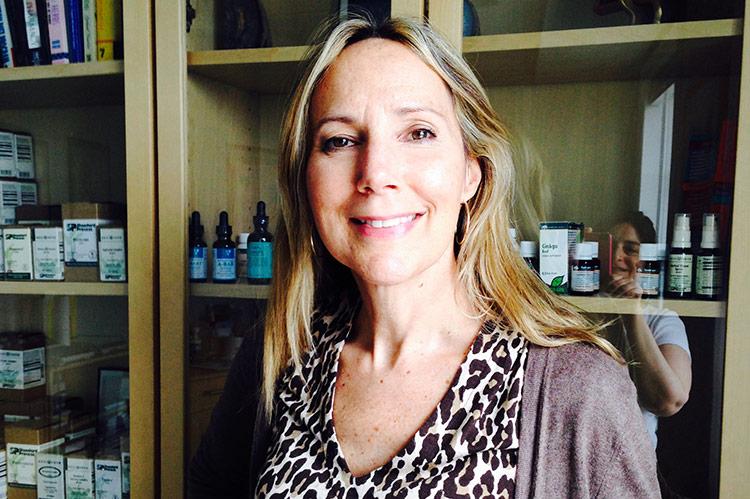Like most functional and alternative health care practitioners, Suzanne Kirby said she entered the field because she wanted to help people. “A lot of people get into this for their own health. I wasn’t sickly, but I wanted to feel better. You want to share it once you realize what you can do.” An art major, she switched to environmental science before focusing on pre-med, but it was nutrition that always fascinated her, even as her interests expanded to other disciplines.
She and her husband, Glenn Goodman, have an integrative medicine practice overlooking the water in Sag Harbor. Their multidisciplinary approach includes chiropractic and homeopathic medicine; muscle, exercise, and bio-magnetic therapy; noninvasive acupuncture and auriculotherapy; nutritional assessment, kinesiology, laser therapy, and more.
Most of these approaches involve hands-on interaction, and as a result Ms. Kirby has kept her office open, with a minimal schedule of appointments and phone consultations where appropriate.
“I see in a week what I would normally see in a day,” she said. “If anyone is sick with symptoms of respiratory infection or anything, I send them remedies or leave them for their families to pick up.” Patients wash up before and after, and she wears gloves and a mask, cleaning up between patients. They also time the appointments so no one has to wait in the sitting area and interact with anyone else. Although they are seeing only a very small number of people, Ms. Kirby said they can see the stress of the shutdown, financial worries, and the fear of the illness in people’s backs and shoulders. “When people are stressed, it manifests itself in the body.”
Her own concerns are centered around the economy and what the shutdown has meant for the business owners in the area. “I have friends who have restaurants who are really struggling. If this goes on for six months, where are we going to be?” She said she thinks her own business can survive for now, but is less certain over the long term, depending on what happens next.
To cope with it, she exercises, walks a lot, and gardens, which she says really helps, along with meditation. She tries to keep herself minimally engaged with the news. “I’m paying attention, but I’m not glued to the television. I get the facts that I need to know and then go on with my day.” She also keeps up with the latest research and other developments in her field through webinars, which keep her positive, even if they’re not relaxing.
She said that much information being offered through the media is fear-based and is making people afraid of one another. “People are very sick and dying, and I’m not belittling it,” she said. She agrees that self-isolation is helping stop the spread of the virus, but worries that people will be afraid of one another even after it’s over. “Not to be Pollyanna, but eventually we’re all going to get immunity to it, even if they don’t come up with a vaccine right away. It’s how the body works.”
While we wait for that day to come, she recommends to her patients that they build up the body’s immune function as best they can to fight the virus and hopefully lessen the body’s reaction to it if exposed.
How to Do It
In terms of building immunity, Ms. Kirby said the old standbys of vitamin C and zinc are very effective, as is washing hands. There are combinations of vitamins, minerals, and herbs such as Immuplex and Bio-Immunozyme Forte that she keeps in her office. She recommends a propolis throat spray, which comes from bees, to help the body’s germ-fighting capabilities.
Reducing sugar intake is critical, she said. “Sugar decreases immune function by half,” and junk food is filled with oils that can also compromise immunity. Being home all day and drinking and eating to cope with the anxiety and boredom can make a big difference in the immune response. “Anything is fine within reason . . . but it can become really dangerous.”
A commitment to eating well is important, and cruciferous vegetables should be part of the plan. “Broccoli, kale, cauliflower, and brussels sprouts are really great at detoxifying the body and supporting the immune system,” she said.
Last but not least, she recommends staying positive. “If you get really depressed, that’s a sure way to shut down the immune system.” Watching the news all day, “it’s really easy to go down the rabbit hole with this thing, to get depressed and more isolated.” It’s important to think and believe “this is going to pass, we’re going to get through this.” Uncertainty brings fear, but getting outside, enjoying the time you can spend with family, exercising, yoga, and meditation can help.
“That’s my biggest thing: to be positive and do things helpful for our souls.”

